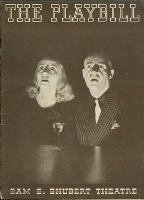The year is 1936. The location is a remote ski lodge in the Italian Alps, formerly the Austrian Alps. An entrepreneur is struggling to keep his hotel in business. Just when his manager tries to tell everyone to clock out early, a group of varied international tourists all show up at once. There’s a British honeymooning couple, an American burlesque troupe, a beautiful Russian femme fatale, a German doctor, a French anarchist, and a rotating band of Italian soldiers. As soon as everyone is settled in, the planes from the Italian military base are heard taking off toward France.

Surely nothing could really go wrong in Idiot’s Delight. Right?
Sherwood’s masterful satire accurately predicts so much of what happened in WWII that you’ll get a chill down your spine. Switch Italy for Germany and France for Poland and he gets the order of involvement in the war perfectly. The minor elements he gets wrong are not so far from the truth. His text is so powerful that he was awarded the Pulitzer Prize in 1936 for Drama.
The technique of building the conflict of Idiot’s Delight is pure Modernism. Sherwood takes every opportunity to mock trends, imitate society, and comment on the nature of theater. The manager of the American dancers, Harry Van, constantly sits at the piano in the lounge and comments on the nature of manipulating an audience. My favorite moment in the script is how Sherwood describes the minor changes he makes to turn a Russian folk song into jazz, “Indian” music, and utter chaos.
This scene is the key to unlocking Idiot’s Delight. Anytime internationalism rises, sparks fly. If two people are holding a conversation in Italian, three people are talking in English at the same time. Characters like the Russian woman, Irene (ih-rain-uh, like Cat People), routinely flow through multiple languages and accents to ignite conflict. It’s bad enough that their countries all hate each other. It’s worse to mock their mother tongue with poor use of dialect. That’s just not proper behavior.
Like any good work of Modernism, there is a play within the play. The American girls and their singing/dancing manager put on an elaborate floor show for Germans, Italians, Austrians, French, and English alike as the planes return to the Italian military base. The show is interrupted by a quartet of troops who are greeted with a “fascist anthem” before the girls go right back into a soft shoe number. The world has changed while they focused on frivolous entertainment and civility is no longer a worthwhile commodity.
Their true biases come out. The accusations of war crimes and mistreatment flow like champagne at the bar. People are written off and lives are changed forever. Even the silly showgirls are told to change their act and step up their game as the key to success in the new world order is cooperation, not competition.
It’s rare for any play, let alone a work of Modernism, to read this well on the page. After a slow introduction–an intentional device of discomfort, Sherwood packs so much action and movement into the script that you have no choice but to engage. Seeing it performed will only add timing and music to a beautifully composed play.
Cross posted at Cannonball Read IV.